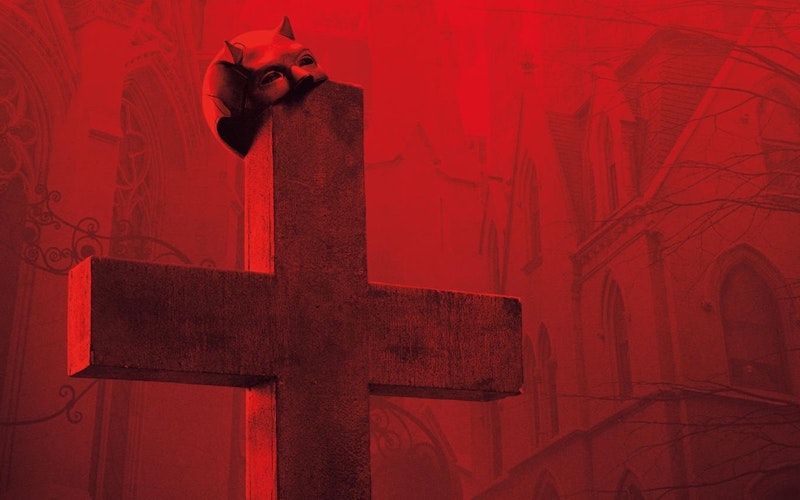
TV
Angels and Daredevils
Much of the buzz surrounding season three of Netflix’s Daredevil relates to how dark the show has become. While sensitive viewers certainly should be warned about the third season’s vivid violence and depraved depiction of institutional fallenness, these dark qualities do not survive as the vital impression of the series. Among its many positive attributes, this newest installment of Daredevil reminds us of the redemptive role that encouragers play in our daily lives and in our salvation. Throughout the story, ancillary characters follow Hebrews’ call to “spur one another on toward love and good deeds, not giving up meeting together, as some are in the habit of doing, but encouraging one another.”
As is often the case in real life, season three reminds us that the absence of positive encouragers can lead to terrible ends. In Benjamin ‘Dex’ Poindexter (Wilson Bethel)—more widely known as Bullseye in the comics—we meet a burgeoning supervillain born with an innate ability to hit any target with deadly accuracy. Through a flashback, we learn that Dex’s psychopathic tendencies emerged early in childhood. His court-appointed psychiatrist, Dr. Eileen Mercer (Heidi Armbruster), guided young Dex away from his violent proclivities and nurtured him toward empathy. Before leaving her care, she assured him, “You just need to find a north star to guide you.” An adult FBI agent and former Army sniper by the time we meet him, Dex is still looking for his star. He falls prey to the charismatic Kingpin of Hell’s Kitchen, the sinister Wilson Fisk (Vincent D'Onofrio). With no one else stepping forward to spur Dex on toward love and good deeds, Fisk manipulates his impressionable young protégé toward heinous acts of murderous crime.
Sometimes even the good guys need encouragers. From the start of season three, we find Matt Murdock, aka Daredevil (Charlie Cox), in a very bad way. Physically injured and ravaged by personal tragedy, he renounces his faith in God and turns his back on his friends, Foggy (Elden Henson) and Karen (Deborah Ann Woll). Matt theologically spars with the priest, Father Lantom (Peter McRobbie) and the nun, Sister Maggie (Joanne Whalley) who raised him. In a grittily-written biblical debate with Sister Maggie, Matt dismissively questions the intelligence (and masculinity) of Job for still loving God after enduring so much suffering. After Sister Maggie bluntly reminds him of his religious heritage, the once-dedicated Catholic superhero muses, “I did believe I was God’s soldier. Well, not anymore. I am what I do in the dark. I bleed for myself.” Matt concludes with an angry flurry: “I know my truth now. In front of this God, I’d rather die as the devil than live as Matt Murdock.” The Devil of Hell’s Kitchen wants nothing to do with God.
Although Matt clearly does not have ears to hear, the encouragers in his life refuse to give up on him.
Although Matt clearly does not have ears to hear, the encouragers in his life refuse to give up on him. After trading salty insults, Sister Maggie hangs a cross beside Matt’s bed, and Father Lantom repeatedly invites his former communicant to attend mass. Outside of the Church, Karen and Foggy do their best to lift up their friend and hold him accountable. During Matt’s period of bitter self-imposed exile, Karen sneaks into his abandoned apartment and selflessly pays his bills. After a hopelessly corrupt legal system releases Wilson Fisk to the world, Matt declares that he must now murder his old adversary. Together, Foggy and Karen implore their friend not to violate the Sixth Commandment. “Killing anyone, even Fisk,” Karen wisely warns, “will change everything that you feel about yourself.”
For his part, Father Lantom’s dedication to serving others extends well beyond gentle acts of verbal encouragement. (Spoiler alert). When Bullseye interrupts an evening Mass bent on murder, Father Lantom steps in front of a projectile meant for Karen. In doing so, he sacrifices his life for Matt’s friend, a women he barely knows. Father Lantom’s last words, “Forgive us,” demonstrate both his religiosity and humility. As a final encouragement, this noble act of self-sacrifice powerfully evokes Jesus’ Gospel call: “Greater love has no one than this: to lay down one's life for one's friends.”
While Daredevil season three portrays its share of darkness, the light eventually overcomes. Sustained and buoyed by his many encouragers, Matt Murdock eventually reclaims his faith in God along with his own image-bearing humanity. In the final episode, an exchange with Sister Maggie gently exemplifies the abiding importance that faithful angels may play in our daily lives. After Sister Maggie praises Matt for returning to the fold, Matt admits his continued need for spiritual encouragement. “Father Lantom used to help me with that,” he says. “I could use someone else to help me with that once in a while.” Called to serve God by encouraging others towards Him, Sister Maggie replies, “I’m a nun, Mathew. Helping is what I was called to do.”
Topics: TV